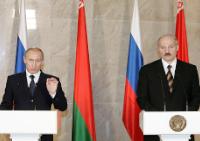Things are not looking good for Belarusian President Alexander Lukashenko. The man who built arguably the most stable, authoritarian and centralized administration in the former Soviet Union is now struggling to maintain control. A forced currency devaluation last month wiped out the savings of ordinary citizens, who subsequently took to the streets, plunging Minsk into chaos. Throughout May, Belarus teetered on the brink of economic collapse, and Lukashenko was rumored to be plotting to flee the country. An emergency $3 billion loan package from Russia, technically administered through the Eurasian Economic Community, has stabilized the situation for now, but the once-unshakeable Lukashenko government looks increasingly vulnerable.
Since his election in 1994, Lukashenko has governed Belarus by sticking to a relatively simple strategy: resurrecting and then maintaining a Soviet-style command economy and insulating Belarus from the economic chaos that engulfed the former Soviet Union in the 1990s. By providing full employment and meager but steady growth, Lukashenko satisfied the limited aspirations of his people and secured his rule.
However, maintaining this neo-Soviet economic system depended on generous Russian assistance, mainly in the form of discounted oil and gas both for domestic consumption and for re-export to European Union markets to raise hard currency reserves. This functioned well during the Yeltsin era, when Moscow was content to subsidize Minsk in return for its political loyalty. However, Russian Prime Minister Vladimir Putin has been more concerned with, in his own words, "separating the flies from the cutlet" so that Russian hegemony in the post-Soviet space becomes a net contributor to Russia's economic resources, rather than a drain on them. Minsk's gas and oil wars with Moscow over the past decade received less press coverage than those between Russia and Ukraine, but they were far more politically savage affairs. In the end, Belarus lost, and after a phase-out period that began in 2007, all Russian oil and gas subsidies were officially terminated last year. Increasing economic hardship swiftly followed, exacerbated by the global financial crisis and a political system designed to squelch, rather than encourage, policy initiative.

